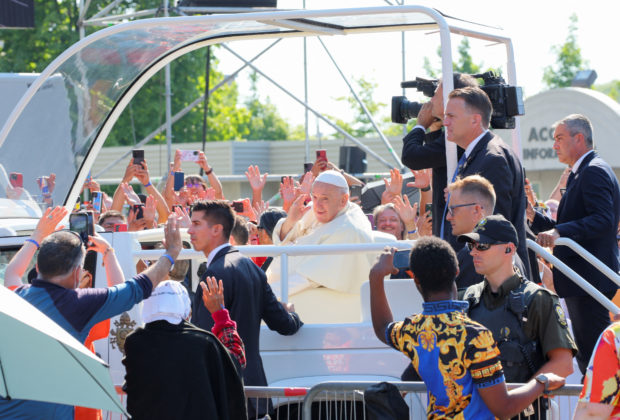
Pope Francis greets the faithful before presiding over a mass at the Shrine of Sainte-Anne-de-Beaupre, one of the oldest and most popular pilgrimage sites in North America, in Sainte-Anne-de-Beaupre, Quebec, Canada July 28, 2022. (REUTERS)
SAINTE-ANNE-DE-BEAUPRE, Quebec – Pope Francis on Thursday said the Catholic Church felt “the burden of failure” for its role in running government-backed residential schools that tried to wipe out indigenous cultures and became places of abuse.
On the penultimate day of his week-long apology tour of Canada, Francis presided at a Mass at the Basilica of Sainte-Anne-de-Beaupre outside Quebec City and spoke of “the burning questions that this pilgrim Church in Canada is asking.”
“In confronting the scandal of evil and the Body of Christ wounded in the flesh of our indigenous brothers and sisters, we too have experienced deep dismay; we too feel the burden of failure,” the pope said.
“Why did all this happen? How could this happen in the community of those who follow Jesus?”
The comments were some of the strongest yet by the pope on the collective failure of the Catholic Church over the abuses at indigenous schools. That is a key issue for some survivors, who said the pope fell short in his historic apology on Monday by largely blaming “many Christians” for the abuse.
Since then, the pope has said the Church is “admitting our faults” and also warned against “defending the institution rather than seeking the truth” on what happened at the schools.
At the start of the Mass, two indigenous women unfurled a banner asking him to formally rescind 15th century edicts, known as the doctrine of discovery, in which the papacy justified the taking of indigenous land in the New World.
The basilica is the oldest Catholic pilgrimage site in North America and stands on the site where a small church was built in 1658 to house a statue of St. Anne that French colonists considered miraculous.
About three-quarters of the 1,400 spots inside the basilica were given to residential school survivors and other indigenous people while thousands of others watched the Mass on giant television screens outside.
Overall, it was the biggest turnout since the pope arrived on Monday.
Psychological counselors were on hand in case needed by residential school survivors.
‘STEP TOWARD HEALING’
More than 150,000 indigenous children were separated from their families and brought to residential schools, which operated between 1870 and 1996.
Many were run by Christian groups for successive Canadian governments’ policy of assimilation. Most were run by Catholic religious orders.
The children were starved or beaten for speaking their native languages and many sexually abused in a system Canada’s Truth and Reconciliation Commission called “cultural genocide.”
The pope on Monday traveled to the town of Maskwacis, the site of two former schools, and issued a historic apology that called the Church’s role in the schools, and the forced cultural assimilation they attempted, a “deplorable evil” and “disastrous error.”
His pleas for forgiveness have evoked strong emotions for many but fell short of what some survivors and indigenous leaders had hoped for.
“I have heard directly from a number of leaders and members of indigenous communities that they would have hoped that he would go further, but at the same time, they felt some comfort in hearing his words,” Prime Minister Justin Trudeau said before entering the church.
“This is a step toward healing but obviously there is more to be done,” he told CBC television.
Trudeau’s office said in a statement that during his private meeting with the pope on Wednesday, he discussed the need for the Church to “take concrete action to repatriate indigenous artifacts, provide access to residential schools documents, address the doctrine of discovery, and ensure justice for survivors, including for the Rivoire case.”
Canada wants France to extradite retired priest Johannes Rivoire so he can face a charge of sexual abuse from when he worked with indigenous in Canada’s North.
Indigenous Canadians have asked the Vatican Museums to return artifacts sent to the Vatican over the centuries by missionaries, including a kayak made of wood and sealskin by the Inuvialuit people of the Mackenzie Delta in the Western Arctic that is believed to be between 100 and 150 years old.
The Vatican said that after the Mass, Francis made an unannounced stop at a Church-run hospice for elderly and HIV/AIDS sufferers.